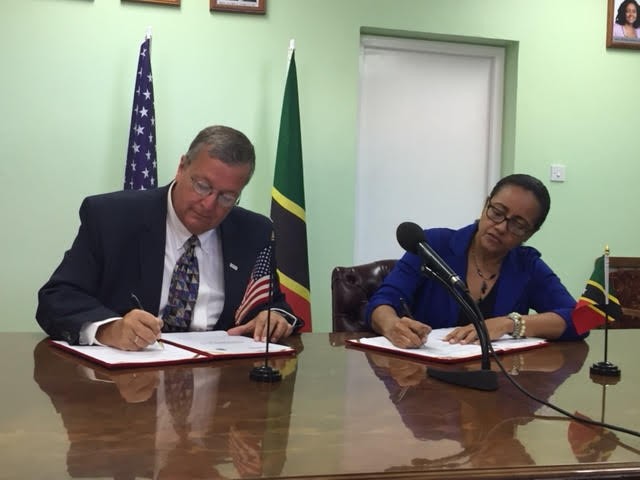You are viewing:
Archived Content
Information released online before January, 2021.
You are viewing:
Information released online before January, 2021.
Note: Content in this archive site is NOT UPDATED, and external links may not function. External links to other Internet sites should not be construed as an endorsement of the views contained therein.
You are entering the 2017-2020 Archive for the
United States Agency for International Development web site.
If you are looking for current information, visit www.usaid.gov.

With youth development and citizen security being top priorities for the United States and Caribbean governments alike, efforts are underway to ensure that at-risk youth in St. Kitts and Nevis receive maximum benefits from the United States Agency for International Development’s (USAID) Youth Empowerment Services (YES) Project.
USAID’s Mission Director, Christopher Cushing, and Minister of State for Health, Community Development, Gender Affairs and Social Services in St. Kitts and Nevis, Wendy Colleen Phipps, today signed a Memorandum of Understanding (MOU) to govern the YES project’s implementation in St. Kitts and Nevis. The MOU deepens an ongoing partnership and exemplifies the commitment of both Governments to the successful implementation of the project. It is intended to foster strong coordination to jointly meet common objectives, and highlight the importance of timely information sharing, effective cooperation, and sustainability planning.
In addressing the signing ceremony, which followed a USAID presentation to the Cabinet on the YES project, Mr. Cushing said, “This MOU being signed today will reinforce the collaboration that currently exists between USAID and the Government of St. Kitts and Nevis. We look forward to continuing to work with our partners on the ground, to create stronger systems and services that build greater resiliency among the youth.”
The YES initiative aims to reduce youth involvement in crime and violence in the Eastern and Southern Caribbean. The project is implemented under three components: the Strengthening Evidence-based Decision Making (CariSECURE) Project which promotes evidence-based decision making for youth crime and violence; the Community, Family and Youth Resilience (CFYR) Project which strengthens these three components of society to withstand, mitigate and recover from involvement in crime and violence; and the Juvenile Justice Reform Project which enhances juvenile justice systems to rehabilitate youth in conflict with the law.
Comment
Make a general inquiry or suggest an improvement.